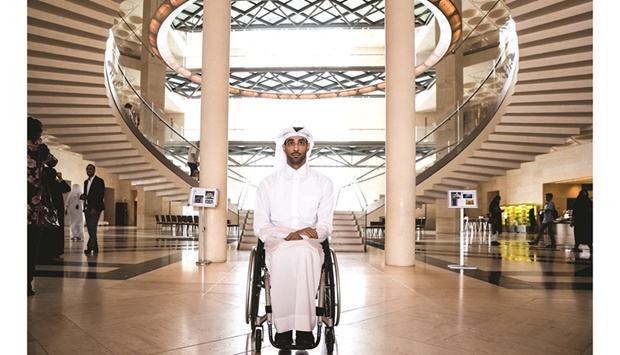• Hosting FIFA World Cup has been catalyst for improved accessibility
Qatar’s hosting of the FIFA World Cup is playing a transformative role in making the country more accessible for disabled people.
The Accessibility Forum – launched by the Supreme Committee for Delivery & Legacy (SC) in 2016 – has been at the centre of planning to ensure tournament facilities and wider public infrastructure meet the requirements of the disabled community.
“The Accessibility Forum ensures that the most important stakeholders in the country, including disabled people, play a direct role in determining how the tournament can leave a legacy for generations to come. We wanted to make sure the World Cup made Qatar more accessible, while setting new standards in how to host accessible sporting events,” said Khaled al-Suwaidi, the SC’s Stakeholder Relations director.
In addition to direct engagements with the SC and tournament organisers, members of the Accessibility Forum have worked closely with organisations in the transportation, hospitality and cultural sectors to make Qatar more accessible. The result has been substantial enhancements – making it easier for people to move around the country and access key sites and services.
Ikrami Ahmad, a blind member of the Accessibility Forum, spoke of the impact of hosting the tournament on disabled people in Qatar.
“There has been a marked difference across the country in recent years,” said Ahmad. “There’s more of an interest in accessibility, regardless of the cost or return on investment. It’s regarded as a human right – and this commitment will be felt by fans visiting Qatar for the World Cup.”
Ahmad said the Doha Metro helps him lead a more independent life.
“The Metro system is one of the best places for blind people in Qatar. The floor indicators and audible announcements create a barrier-free journey. Knowing the delivery of the Metro system was accelerated due to the World Cup is one of the many ways that the legacy of the tournament is already being felt by the disabled community in Qatar.”
Wheelchair athlete Ahmad al-Shahrani confirmed the progress in recent years.
“We can see greater accessibility in shopping malls, libraries, universities and hospitals. I would say that that 80% of key locations in Qatar are wheelchair accessible – something which benefits disabled people and others,” said al-Shahrani.
Ghanimeh al-Taweel believes the FIFA World Cup is creating a fundamental shift in the way disability is seen in Qatar.
“The accessible infrastructure has led to more disabled people being seen out and about in our communities – on the streets, in work places and schools. It means greater integration and a voice at the decision-making table,” said al-Taweel, who is an accessibility researcher.
In addition to accessible infrastructure, this year’s FIFA World Cup will introduce a range of new features for the disabled community. For the first time, blind and partially sighted fans will be able to listen to audio descriptive commentary in Arabic at World Cup matches. The service is accessible through a mobile application and will be available at all eight stadiums.
Sensory rooms will also be offered at different stadiums to provide neuro-divergent fans with the ability to watch matches in a quieter space, equipped with assistive technology and managed by expert staff.
The rooms will be installed by the SC and local stakeholders.
“We are aiming to deliver the most accessible version of the FIFA World Cup in history,” added al-Suwaidi. “We are continually working with stakeholders to ensure the entire user journey is barrier-free. It is important we involve all sectors of society in our activities. We want everyone in Qatar to be a part of the first World Cup in our region.”

Accessibility Forum at MIA, Doha, Qatar on 10 May 2018



